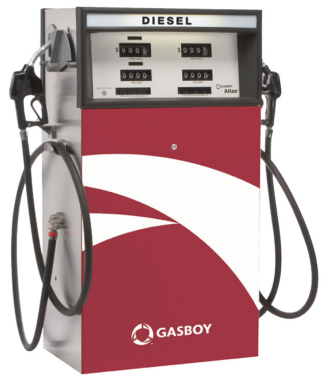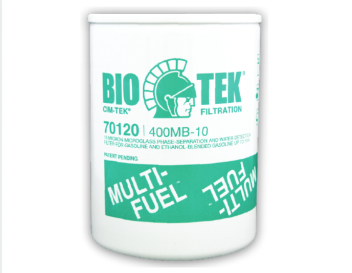This fuel dispenser filter guide has been designed for gas station owners just starting off in the business and may want to learn about the basics of fuel dispenser filter –what it is, how it helps maintain fuel and gasoline quality and what safety considerations should one keep in mind when replacing a fuel dispenser filter.
Fuel dispenser filter is a device that captures gunk, debris, water and everything else that you don’t want in your customer’s car tank.
It sits right there, in your fuel dispenser.

And here is how it looks:

Of course, not every filter is green colored and have the same specifications written on it as shown in the picture above, but you get the gist.
How it cleans the fuel?
A fuel dispenser filter consists of interlaced fibrous material twisted and turned into myriad directions to create a membrane.
This membrane has a number of small pores of consistent diameter to allow fluid to pass through it. The filter shown above has a pore size of 10-microns.
What this means is, it would only let those substances pass through it which have a particulate size of 10 microns or less. Any particulate matter having a diameter greater than 10 microns will be filtered out. The smaller is the pore size, the finer is the filtration process.
When you press on the lever on your fuel nozzle, fuel travels up from the underground storage tank, passes through the filter, gets filtered in the process and comes out from the nozzle tip all cleaned – before finally going into the car tank.
For different fuel types, you have different filters. Filters for DEF, filters for ethanol, filters for gasoline etc. etc.
Now let’s talk about filter replacement.
Fuel dispenser filters should be replaced when needed and no less than once a year. If your customers begin to complain fuel is pumping slowly from one particular hose or dispenser, chances are the filter needs to be changed. A number of factors can contribute to this from the age of the tanks, to the amount of debris in the tanks, etc., especially if customers are pumping during a delivery as this is when any debris in the tank really gets stirred up that can clog filters.
At John W Kennedy Company, we strongly recommend that you only get your filter replaced by a qualified service technician.
Why?
Because filter replacement entails a number of safety considerations, which if not followed, can lead to spills and serious accidents.
Here is a quick review of few of them. Make sure your service technician follows these guidelines when replacing a filter:
- The shear valve should be tripped
- The emergency shut off switch should be closed
- Use a containment bucket to prevent drips and spills
- Always run a leak test after installing a filter
Once the filter has been replaced, stamp the replacement date on it so that you will remember when to change it next.
Do you have any questions in particular about fuel dispenser filters? Feel free to reach out, we will be happy to help you.
We also supply high quality fuel dispenser filters at very reasonable prices, so if you are looking for one, make sure to check out our inventory.
A BONUS read: The Essentials of Gas Station Forecourt Lighting





Pingback: Customers Don’t Like Slow-Flowing Gas Pumps! Here’s What You Should Do – John W. Kennedy Company Blog